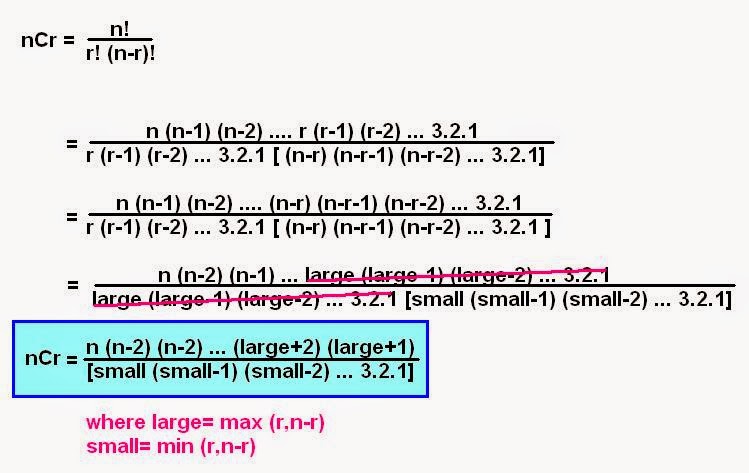We used a simple function to calculate nCr in an earlier program to display Pascal's Triangle. It shows the values of binomial coefficients upto n=12. We then used a more efficient algorithm to display Pascal's Triangle. Let us now use a more efficient program to find single binomial coefficients. Here is how we can do this.
- We add read statements to read values of n and r at the time of execution. We can also add a GOTO statement to read new values.
- We add an integer function o calculate nCr. For this, we need to set nCr when n=r as 1. i.e.nCn=1. This also true for 0C0. Similarly, we set nC0=1.
- Next, we need to run a DO loop to calculate the factorial in the numerator. No, wait a minute. This calculation can be made a little simpler. As we know, n>r for all the n,r pairs after having dealt with trivial cases above. Therefore, r! and (n-r)! will already be included in n!. We can, therefore, simplify calculations as shown in the picture. Here you go.
Simplified Formula for nCr used in the Program
Now for the Fortran program,
!Program to find nCr
program Combinations
implicit none
integer n,r,cont
10 write (*,*) "Give the value of n (the total no. of objects)"
read (*,*) n
write (*,*) "Give the value of r (the number of objects selected at a time)"
read (*,*) r
write (*,*) "Calculating the total number of possible combinations"
write(*,20) n,"C",r,"= ",nCr (n,r)
write(*,*)
20 format (i10,a,i10,a,i10) !You can alter the format as per your requirement
write(*,*) "Press 1 to continue. Press 2 to exit" !To read more values. Optional
read (*,*) cont
write(*,*)
write(*,*)
if (cont==1) then
goto 10
else
stop
end if
contains
integer function nCr (n,r)
integer n,r,i, Numer,Denom, large,small
if (n==r) then
nCr=1
else if (r==0) then
nCr=1
else if (r.lt.(n-r)) then
small=r
large=n-r
else
large=r
small=n-r
end if
Numer=n
do i=n-1,(large+1),-1 !To save you the trouble of calculating lengthy factorials
Numer=Numer*i
end do
Denom=small
do i=small-1,2,-1
Denom=Denom*i
end do
nCr=Numer/Denom
end function
end program Combinations
!Program to find nCr
program Combinations
implicit none
integer n,r,cont
10 write (*,*) "Give the value of n (the total no. of objects)"
read (*,*) n
write (*,*) "Give the value of r (the number of objects selected at a time)"
read (*,*) r
write (*,*) "Calculating the total number of possible combinations"
write(*,20) n,"C",r,"= ",nCr (n,r)
write(*,*)
20 format (i10,a,i10,a,i10) !You can alter the format as per your requirement
write(*,*) "Press 1 to continue. Press 2 to exit" !To read more values. Optional
read (*,*) cont
write(*,*)
write(*,*)
if (cont==1) then
goto 10
else
stop
end if
contains
integer function nCr (n,r)
integer n,r,i, Numer,Denom, large,small
if (n==r) then
nCr=1
else if (r==0) then
nCr=1
else if (r.lt.(n-r)) then
small=r
large=n-r
else
large=r
small=n-r
end if
Numer=n
do i=n-1,(large+1),-1 !To save you the trouble of calculating lengthy factorials
Numer=Numer*i
end do
Denom=small
do i=small-1,2,-1
Denom=Denom*i
end do
nCr=Numer/Denom
end function
end program Combinations
 |
| Sample Output. You can get all values upto n=17. Beyond that, you can still get results if r is not close to n/2, which results in very large values (around the middle of a row in Pascal's triangle). |

No comments:
Post a Comment